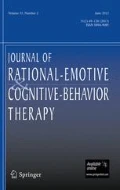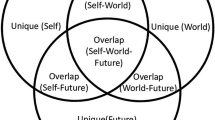Abstract
The present paper examines a measure of perfectionistic automatic thoughts in terms of its psychometric properties and association with depression in adolescents. The Perfectionism Cognitions Inventory (PCI) was administered to two samples of adolescents. The first sample of adolescents (N = 250) also completed measures of trait perfectionism and depression. The second sample of adolescents (N = 105) completed these same measures as well as measures of negative automatic thoughts, positive automatic thoughts, self-criticism, and dependency. Psychometric analyses established that the PCI consists of one large factor with a high level of internal consistency. As expected, the PCI in adolescents was correlated significantly with trait measures of perfectionism, self-criticism, dependency, as well as general measures of automatic thoughts. Most importantly, a series of hierarchical regressions established that the PCI accounted for a significant degree of unique variance in depression, over and above the variance attributable to trait personality measures and negative automatic thoughts in general. Overall, the findings suggest perfectionistic automatic thoughts can be assessed in a reliable and valid manner in adolescents and that the experience of frequent, perfectionistic thoughts contributes uniquely to increased levels of psychological distress.
Similar content being viewed by others
References
Abela, J. R. Z., & Hankin, B. L. (2007). Cognitive vulnerability to depression in children and adults: A developmental psychopathology perspective. In J. R. Z. Abela & B. L. Hankin (Eds.), Handbook of depression in children and adolescents (pp. 35–78). New York: Guilford.
Ambrose, B., & Rholes, W. S. (1993). Automatic cognitions and the symptoms of depression and anxiety in children and adolescents: An examination of the content-specificity hypothesis. Cognitive Therapy and Research, 17, 153–171.
Arpin-Cribbie, C. A., Irvine, J., Ritvo, P., Cribbie, R. A., Flett, G. L., & Hewitt, P. L. (2008). Perfectionism and psychological distress: A modeling approach to understanding their therapeutic relationship. Journal of Rational-Emotive & Cognitive-Behavior Therapy, 26, 151–167.
Briggs, S. R., & Cheek, J. M. (1986). The role of factor analysis in the development and evaluation of personality scales. Journal of Personality, 54, 106–148.
Burgess, E., & Haaga, D. A. F. (1994). The positive automatic thoughts questionnaire and the automatic thoughts questionnaire—revised: Equivalent measures of positive thinking? Cognitive Therapy and Research, 18, 15–24.
Clara, I. P., Cox, B. J., & Enns, M. W. (2007). Assessing self-critical perfectionism in clinical depression. Journal of Personality Assessment, 88, 309–316.
Dobson, K. S., & Breiter, H. J. (1983). Cognitive assessment of depression: Reliability and validity of three measures. Journal of Abnormal Psychology, 92, 107–109.
Enns, M. W., & Cox, B. J. (1999). Perfectionism and depressive symptom severity in major depressive disorder. Behaviour Research and Therapy, 37, 783–794.
Enns, M. W., & Cox, B. J. (2002). The nature and assessment of perfectionism: A critical analysis. In G. L. Flett & P. L. Hewitt (Eds.), Perfectionism: Theory, research, and treatment (pp. 33–62). Washington, DC: American Psychological Association.
Enns, M. W., Cox, B. J., & Inayatulla, M. (2003). Personality predictors of outcomes for adolescents hospitalized for suicidal ideation. Journal of the American Academy of Child and Adolescent Psychiatry, 42, 720–727.
Fehon, D. C., Grilo, C. M., & Martino, S. (2000). A comparison of dependent and self-critically depressed hospitalized adolescents. Journal of Youth and Adolescence, 29, 93–106.
Fichman, L., Koestner, R., & Zuroff, D. C. (1994). Depressive styles in adolescence: Assessment, relation to social functioning, and developmental trends. Journal of Youth and Adolescence, 23, 315–330.
Fichman, L., Koestner, R., & Zuroff, D. C. (1996). Dependency, self-criticism, and perceptions of inferiority at summer camp: I’m even worse than you think. Journal of Youth and Adolescence, 25, 113–126.
Flett, G. L., Hewitt, P. L., Blankstein, K. R., & Gray, L. (1998). Psychological distress and the frequency of perfectionistic thinking. Journal of Personality and Social Psychology, 75, 1363–1381.
Flett, G. L., Hewitt, P. L., Boucher, D. J., Davidson, L. A., & Munro, Y. (1997). The child-adolescent perfectionism scale: Development, validation, and association with adjustment. Unpublished manuscript, York University, Toronto.
Flett, G. L., Hewitt, P. L., Whelan, T., & Martin, T. R. (2007). The perfectionism cognitions inventory: Psychometric properties and associations with distress and deficits in cognitive self-management. Journal of Rational-Emotive & Cognitive-Behavior Therapy, 25, 255–277.
Frost, R. O., Marten, P. A., Lahart, C., & Rosenblate, R. (1990). The dimensions of perfectionism. Cognitive Therapy and Research, 14, 449–468.
Garber, J., Weiss, B., & Shanley, N. (1993). Cognitions, depressive symptoms, and development in adolescents. Journal of Abnormal Psychology, 102, 47–57.
Glass, C. R., & Arnkoff, D. B. (1997). Questionnaire methods of cognitive self-statement assessment. Journal of Consulting and Clinical Psychology, 65, 911–927.
Hewitt, P. L., Caelian, C. F., Flett, G. L., Sherry, S. B., Collins, L., & Flynn, C. A. (2002). Perfectionism in children: Associations with depression, anxiety, and anger. Personality and Individual Differences, 32, 1049–1061.
Hewitt, P. L., & Flett, G. L. (1991). Perfectionism in the self and social contexts: Conceptualization, assessment, and association with psychopathology. Journal of Personality and Social Psychology, 60, 456–470.
Hewitt, P. L., & Flett, G. L. (1993). Dimensions of perfectionism, daily stress, and depression: A test of the specific vulnerability hypothesis. Journal of Abnormal Psychology, 102, 58–65.
Hewitt, P. L., & Genest, M. (1990). The ideal-self: Schematic processing of perfectionistic content in dysphoric university students. Journal of Personality and Social Psychology, 59, 802–808.
Hollon, S. D., & Kendall, P. C. (1980). Cognitive self-statements in depression: Development of an automatic thoughts questionnaire. Cognitive Therapy and Research, 4, 383–395.
Ingram, R. E., Kendall, P. C., Siegle, G., Guarino, J., & McLaughlin, S. C. (1995). Psychometric properties of the positive automatic thoughts questionnaire. Psychological Assessment, 7, 495–507.
Ingram, R. E., Slater, M. A., Atkinson, J. H., & Scott, W. (1990). Positive automatic cognition in major affective disorder. Psychological Assessment, 2, 209–211.
Ingram, R. E., & Wisnicki, K. S. (1988). Assessment of automatic positive cognition. Journal of Consulting and Clinical Psychology, 56, 898–902.
Jolly, J. B., & Dykman, R. A. (1994). Using self-report data to differentiate anxious and depressive symptoms in adolescents: Cognitive content specificity and global distress? Cognitive Therapy and Research, 18, 25–37.
Jolly, J. B., & Wiesner, D. C. (1996). Psychometric properties of the automatic thoughts questionnaire-positive with inpatient adolescents. Cognitive Therapy and Research, 20, 481–498.
Kaufman, N. K., Rohde, P., Seeley, J. R., Clarke, G. N., & Stice, E. (2005). Potential mediators of cognitive-behavioral therapy for adolescents with comorbid major depression and conduct disorder. Journal of Consulting and Clinical Psychology, 73, 38–46.
Kazdin, A. E. (1990). Evaluation of the automatic thoughts questionnaire: Negative cognitive processes and depression among children. Psychological Assessment, 2, 73–79.
Kowalenko, N., Rapee, R. M., Simmons, J., Wignall, A., Hoge, R., Whitefield, K., et al. (2005). Short-term effectiveness of a school-based early intervention program for adolescent depression. Clinical Child Psychology and Psychiatry, 10, 493–507.
Lightsey, O. R. (1994). Positive cognitions as moderators of the negative life event-depression relationship. Cognitive Therapy and Research, 18, 353–365.
Marien, W. E., & Bell, D. J. (2004). Anxiety- and depression-related thoughts in children: Development and evaluation of a cognitive measure. Journal of Clinical Child and Adolescent Psychology, 33, 717–730.
McWhinnie, C. M., Abela, J. R., Knauper, B., & Zhang, C. (2009). Development and validation of the revised children’s dysfunctional attitudes scale. British Journal of Clinical Psychology, 48, 287–308.
Muris, P., Mayer, B., den Adel, M., Roos, T., & van Wamelen, J. (2009). Predictors of change following cognitive-behavioral treatment of children with anxiety problems: A preliminary investigation of negative automatic thoughts and anxiety control. Child Psychiatry and Human Development, 40, 139–151.
Nock, M. K., & Kazdin, A. E. (2002). Examination of affective, cognitive, and behavioral factors and suicide-related outcomes in children and young adolescents. Journal of Clinical Child and Adolescent Psychology, 31, 48–58.
Radloff, L. (1977). The CES-D scale: A self-report depression scale for research in the general population. Applied Psychological Measurement, 1, 385–401.
Roberts, R. E., Andrews, J. A., Lewinsohn, P. M., & Hops, H. (1990). Assessment of depression in adolescents using the Center for Epidemiologic Studies in depression scale. Psychological Assessment, 2, 122–128.
Ronan, K. R., & Kendall, P. C. (1997). Self-talk in distressed youth: States-of-mind and content specificity. Journal of Clinical Child Psychology, 26, 330–337.
Schniering, C. A., & Lyneham, H. J. (2007). The children’s automatic thoughts scale in a clinical sample: Psychometric properties and clinical utility. Behaviour Research and Therapy, 45, 1931–1940.
Schniering, C. A., & Rapee, R. M. (2002). Development and validation of a measure of children’s automatic thoughts: The children’s automatic thoughts scale. Behaviour Research and Therapy, 40, 1091–1109.
Schniering, C. A., & Rapee, R. M. (2004). The relationship between automatic thoughts and negative emotions in children and adolescents: A test of the cognitive content-specificity hypothesis. Journal of Abnormal Psychology, 113, 464–470.
Spence, S. H., Sheffield, J. K., & Donovan, C. L. (2003). Preventing adolescent depression: An evaluation of the problem solving for life program. Journal of Consulting and Clinical Psychology, 71, 3–13.
Spence, S. H., & Shortt, A. L. (2007). Research review: Can we justify the dissemination of universal, school-based interventions for the prevention of depression among children and adolescents? Journal of Child Psychology and Psychiatry, 48, 526–542.
Acknowledgments
This research was supported by a grant from the Social Sciences and Humanities Research Council of Canada awarded to the authors as well as a Research Impact Knowledge Mobilization Grant awarded to the first author. Gordon Flett was supported by a Canada Research Chair in Personality and Health.
Author information
Authors and Affiliations
Corresponding author
Rights and permissions
About this article
Cite this article
Flett, G.L., Hewitt, P.L., Demerjian, A. et al. Perfectionistic Automatic Thoughts and Psychological Distress in Adolescents: An Analysis of the Perfectionism Cognitions Inventory. J Rat-Emo Cognitive-Behav Ther 30, 91–104 (2012). https://doi.org/10.1007/s10942-011-0131-7
Published:
Issue Date:
DOI: https://doi.org/10.1007/s10942-011-0131-7




